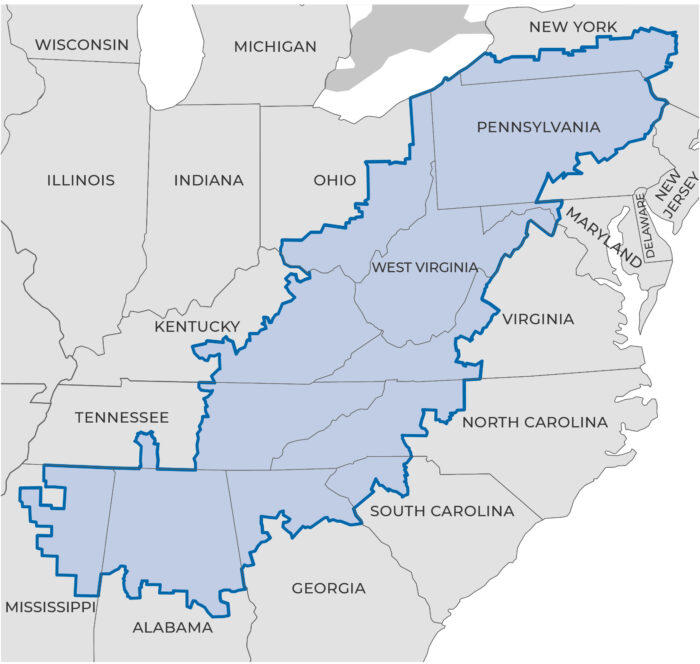
Section Branding
Header Content
Georgia Today: Appeal for teacher raise; Georgia Power environmental controversy; Appalachian food
Primary Content
LISTEN: On the Friday Nov. 3 edition of Georgia Today: The state's school superintendent is asking for another teacher pay raise; environmentalist are speaking out against Georgia Power's request to boost its electricity output. and we'll look at how food from Appalachia has shaped perceptions of the region and its people.

Peter Biello: Welcome to the Georgia Today podcast from GPB News. Today is Friday, Nov. 3. I'm Peter Biello. On today's episode, the state school superintendent is asking for another pay raise for teachers. Environmentalists are speaking out against Georgia Power's request to boost electricity output. And we'll look at how food from Appalachia has shaped perceptions of the region and its people. These stories and more are coming up on this edition of Georgia Today.
Story 1:
Peter Biello: Environmentalists are pushing back against a request by Georgia Power to boost its electricity generation, mostly through fossil fuel consumption. GPB's Grant Blankenship has more.
Grant Blankenship: Georgia Power says they want to add another decade of burning coal and bring new natural gas generation online — part of the plan to make 17 times more electricity compared to projections approved by the Public Service Commission last year. The utility says explosive growth in the electric vehicle industry requires it. Southern Environmental Law Center attorney Jennifer Whitfield says the company should instead invest in wide-scale energy efficiency.
Jennifer Whitfield: By helping companies or helping homeowners or anyone who's connecting to the grid be more energy efficient, they reduce the need to produce new energy.
Grant Blankenship: Georgia Power and others like the SELC, will make their cases to the Public Service Commission in coming months. For GPB News, I'm Grant Blankenship in Macon.
Story 2:
Peter Biello: Georgia's top school official is calling on lawmakers to give teachers a $3,000 raise next year. State school Superintendent Richard Woods made the call yesterday. Such a raise could cost the state up to a half billion dollars. Several factors could give the proposal a boost, however. Georgia was sitting on $16 billion in unspent funds at the end of the last fiscal year, including $11 billion in undesignated reserves. And all 236 members of the General Assembly are up for reelection next year. A spokesperson for Gov. Brian Kemp declined to comment on a possible pay raise, saying the governor would release his budget proposal in January.
Story 3:
Peter Biello: The Georgia Court of Appeals has ruled that cannabis-derived Delta 8 and Delta 10 are not controlled substances. The ruling yesterday came in the case of a distributor whose products were seized by police in metro Atlanta's Gwinnett County. Attorney Tom Church represents the company, Elements Distributing. He says the ruling affects not only product sellers, including convenience stores, but also people who use the products often sold as gummies.
Tom Church: These are not drug dealers. These are small business owners. And they were under attack by, you know, law enforcement agencies that were mistaken as to what the law was. So I think this is vindication. But at the same time, I would urge all these companies that are selling our products to be responsible, which means make sure that their certificates of analysis with the products they purchase, which show that these have been tested, these have been, you know, manufactured to to the right regulations, that there are impermissible amounts.
Peter Biello: It's the latest court decision stemming from a 2019 law that legalized hemp products in Georgia. The Gwinnett County district attorney previously had characterized the products as dangerous and could appeal the ruling.

Story 4:
Peter Biello: The number of teenagers using tobacco products is going down. And the Food and Drug Administration is calling that a win. GPB's Ellen Eldridge reports most of the declines are among e-cigarette users.
Ellen Eldridge: Usage of that product dropped from 16.5% to 12.4%, although flavored e-cigarettes remain the most popular product among high school students. The National Youth Tobacco Survey found 90% of them use flavored products which are illegal. Brian King is the director of the FDA's Center for Tobacco Products. He says there are only 23 authorized e-cigarettes, products and devices.
Brian King: We are taking action to remove illegal products from the marketplace. And that includes a variety of different actions, including warning letters, as well as the round of civil money penalties we issued.
Ellen Eldridge: King says raising state taxes on cigarettes is one of the most effective ways to reduce consumption. So far, efforts to do that in Georgia have failed. Tobacco taxes here remain some of the lowest in the nation. For GPB News, I'm Ellen Eldridge.
Story 5:
Peter Biello: A Texas-based company plans to build a $2 billion data center in metro Atlanta's Douglas County. Databank announced plans for a 95-acre site in Lithia Springs on Tuesday. The facility would be the company's fourth data center in the Atlanta area and one of the region's largest. A databank spokesperson says they plan to employ between 50 and 70 employees at the new site. Data centers typically don't hire many workers, but can substantially increase area tax revenue and demand for energy.
Story 6:
Peter Biello: You may have noticed it's been a while since we've gotten significant rain in Georgia. An expanding drought in North Georgia is heightening the risk for wildfires there. Some parts haven't seen rain in two weeks and there's none in next week's forecast. Firefighters contained several concerning blazes this week, including one that scorched about 80 acres near Hiawatha. Steven Bekkerus is with the National Forest service.
Steven Bekkerus: At the moment, the fires that have started just in the last few days, we've got those under control. But you know, things can change at a moment's notice. If the wind picks up and the conditions are out there and we get a lot of careless campfires and other things, that might start new wildfires.
Peter Biello: He's urging people to douse campfires carefully and keep vehicles off dry grass.

Story 7:
Peter Biello: Food from Appalachia is having a moment. You may have read articles about it in national publications or eaten at restaurants solely dedicated to the cuisine. But the food from Appalachia wasn't always respected. The recently released book Appalachia on the Table explores representations of the region's food from the turn of the 20th century until today, and how those depictions of food have influenced stereotypes of Appalachia and its people. GPB's Devon Zwald spoke with the author, Erika Abrams Locklear.
Devon Zwald: So I want to start with a concept that emerges in the late 1800s and early 1900s that you talk about in your book that calls Appalachia a region distinctly separate from other parts of the country. How did people arrive at this viewpoint and how did food specifically contribute to that emergence?
Erica Abrams Locklear: It's an interesting question that scholars, historians, American studies folks, literature critics have been grappling with for quite some time. So local color writers, in particular, and writers of travel narratives in the late 1800s and early 1900s are often cited as sort of part of the cultural genesis of a lot of ideas about Appalachia. A scholar named Henry Shapiro is probably the best-known person to write about that. And so I was building from his ideas and what I noticed I found really fascinating and equally disturbing is that in a lot of that literature where you find some very familiar stereotypes even today of mountain people, the descriptions of food were very similar. And that one word in particular kept coming up, and that's "coarse" — c-o-a-r-s-e. And when it was used to describe the food, the idea was that it was too greasy, it was not properly prepared, it was difficult to digest and it was something to be avoided. When the word was applied to people then the idea was that these people who were consuming this coarse food were considered uncivilized or unsophisticated or uncouth and, like the food, probably best avoided. And it was a paradigm that I saw coming up again and again.
Devon Zwald: There are also a lot of examples of celebrations of Appalachian foods in the book. How did these celebrations complicate people's perceptions of the region?
Erica Abrams Locklear: Right. So one of the driving questions of this project is how is it that you've got this sort of national idea of a region and its people and its cuisine come from such a denigrated place at the turn of the 20th century to this kind of celebrated novelty? Which is where we've arrived now. People all across America are really into Appalachian food right now. In April, the same month that my book came out, of 2023, Bon Appetit magazine published a 16-page spread called "Appalachia Anew." And there are articles in The Washington Post and in The New York Times. There are restaurants devoted solely to Appalachian cuisine. And so it's definitely being celebrated.
Devon Zwald: Is there anything that you want for people who have a new interest in Appalachian food to consider when they cook or they eat it?
Erica Abrams Locklear: Oh, yes. I think the biggest one is to be aware that it's not a good idea to curate a list of foods that count as Appalachian at the exclusion of other foods. And a lot of this has to do with the erasure of the indigenous roots of Appalachian food, with the contributions that people descended from enslaved people and free people of color have made to Appalachian cuisine. Another part of it is to be aware of access and to ask yourself how much do the ramps cost at this restaurant versus how much do they cost at the community supper. And should I go to that community supper as well?
Devon Zwald: And what are ramps? For those of us who aren't familiar.
Erica Abrams Locklear: Ramps are a forageable. Sometimes people call them wild leeks. Sometimes people call them wild onions. They're technically not an onion, but they're very related. And they're extremely strong and pungent. And so, if you eat a raw ramp, the scent of it stays with you for a really long time. And in mid-20 century Appalachia, ramps were not really considered cool. It was something that people who didn't have access to other fresh greens might eat in the springtime of the year. But there were ramp festivals at that time. But it was a very localized kind of consumption, whereas now they are extremely trendy, extremely popular and very expensive, often over $20 a pound.
Devon Zwald: You mentioned groups that have been erased from conversations around Appalachian food. How do you bring those groups back into the conversation?
Erica Abrams Locklear: Yeah, again, I think just being aware and asking questions and trying to do your own research. To go back to the ramps example, ramps are an important part of Cherokee culinary history as well, and there are ramp festivals in Cherokee, North Carolina, that coincide with the opening of trout season.
Devon Zwald: Erika Abrams Locklear is the author of Appalachia on the Table. Thank you for your time.
Erika Abrams Locklear: Thank you so much.

Story 8:
Peter Biello: The Atlanta Braves says the team is not responsible for injuries sustained by a fan when a player threw a ball into the stands during the 2021 World Series. A lawsuit filed last week claims former Braves outfielder George Soler threw a ball too hard into the stands and hit Mary Norris in the eye. Just before the statute of limitations ran out. Norris and her husband sued both the Braves and Soler. Their lawyer says Soler there should have been more careful. In a statement, a spokesperson for the Braves says the team plans to ask the court to dismiss the case based on legal precedent known as the baseball rule. That rule protects teams from liability if fans are injured by a batted or thrown ball, provided that there are areas in the park where fans have some protected seating. Soler did not respond to GPB's requests for comment.
Story 9:
Peter Biello: In other sports news, Braves star outfielder Ronald Acuña Jr has been voted player of the year and the National League's outstanding player by fellow major leaguers in the annual Players Choice Awards of the Major League Baseball Players Association. Acuna became the first player with 40 homers and 70 stolen bases in a season, hitting .337 with 41 homers, 106 RBIs and 73 stolen bases in football. The Georgia Bulldogs will put their 25-game winning streak on the line this weekend as they face Missouri, allowing 14.8 points per game. The Bulldogs set a season high with four sacks in last week's win over Florida in Jacksonville. And in basketball, the Atlanta Hawks hit the road to face the Pelicans in New Orleans tomorrow. The Hawks beat the Wizards on Wednesday, bringing the record to three and two, putting them third in the Eastern Conference.
And that is it for this edition of Georgia Today. Thank you so much for tuning in. If you want to learn more about any of these stories, visit our website, GPB.org/news. And don't forget to subscribe to this podcast. We'll be back in your podcast feed on Monday afternoon. And if you've got feedback, send it our way by email. The address is GeorgiaToday@GPB.org. I'm Peter Biello. Thanks again for listening. We'll see you next week.
---
For more on these stories and more, go to GPB.org/news



